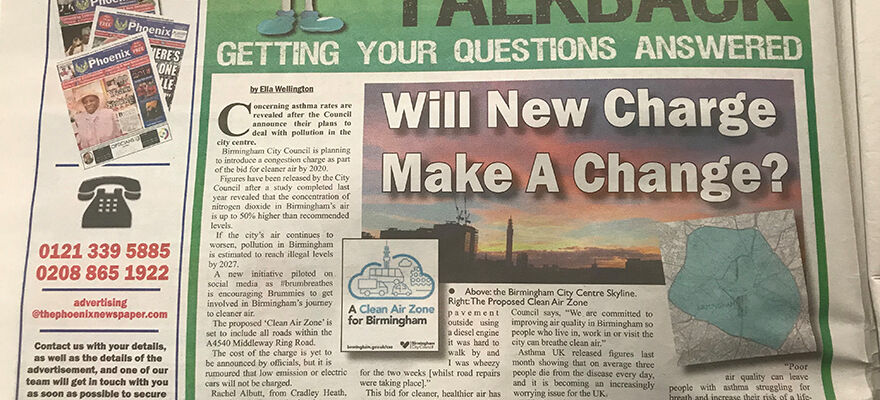Hussein Yusuf and Ella Wellington were given the opportunity to film games, interview players and write up match reports for Aston Villa Ladies FC.
They gave us an insight into their voluntary work and what they enjoyed most about the opportunity to practice their journalism skills in a real-life setting.
How did you get the opportunity to volunteer at Aston Villa Ladies FC?
Hussein: The opportunity came about when our tutor Marverine informed us about it. I opted in straight away because sports journalism is what I want to get into and specialise in.
Ella: The opportunity to volunteer at Aston Villa Ladies came about during my Professional Journalism module from my tutor, Marverine. She presented the opportunity to the class and despite not knowing anything about football, I thought I would give it a go to strengthen my journalistic style and try something new.
What did you do during your time as a volunteer?
Hussein: We took turns to film the game from different positions (halfway line and behind the goal). We interviewed the players before and after the game and some members of the group, including myself, wrote up the post-match summary, which included names of goal scorers and descriptions of the goals.
Ella: A typical match day volunteering would begin with a briefing from the media officer which would include what we would be doing that day. Normally, we would begin with interviewing one of the players ahead of the game, asking how they think the season is going and what they think the girls need to do in this game. We would then spend the match filming highlights and promotional material which could be used for their website or social media.
After the match days, I transcribed interviews and wrote up articles from the interviews. My first article was published to their newsletter. It was a great to see something I’d written in a real-life publication and not just on my computer screen.
How did you collaborate with other students?
Hussein: I worked closely with Jestina (a second year School of Media student). We took turns to film the game and worked together to write up key questions for the players after the game.
Ella: Each match day consisted of two or three students helping out so we would take it in turns to operate the camera, write notes on the game or ask interview questions. I hadn't met the the students that I worked with before as they were from other years, but we got on well and worked together collaboratively.
How did the experience help you with your university work/ future career aspirations?
Hussein: One of the ways that the experience helped me was seeing the level of professionalism Villa and City’s media teams had. This made me understand that whatever journalistic role I go into, it’s important to do a great job and always stay professional.
After reading the match day report I also took key notes on how a great news story should be presented and written.
Working with Villa Ladies made me realise that there are so many roles within a media group and it’s important to improve skills in all areas, whether it’s videography, photography or writing up stories, so when I do go for a job I will be skilled in each department.
Ella: My experience reporting for Aston Villa Ladies was varied and insightful. I not only learnt how to think on my feet and make quick judgements about good content, but I learnt how to diversify my writing by venturing into a topic that was alien to me: sports journalism. For future endeavours, this experience will encourage me to throw myself into new opportunities that at first, may seem daunting. It’s given me the confidence to try new things, new styles of journalism.
The Phoenix newspaper
As well as her work at Aston Villa Ladies FC, Ella also had a piece of work published in The Phoenix newspaper.
She pitched the article idea to The Phoenix newspaper through a reporting opportunity that arose during her Professional Journalism module, which they then decided to run.
 What inspired your piece about pollution in the city centre?
What inspired your piece about pollution in the city centre?
When I was looking for a story to write, I came across a report that detailed how Birmingham would be getting a congestion charge (Clean Air Zone/CAZ charge). After further research into this, I decided to look into who the high pollution levels really affect. This is where I began to look into asthma sufferers in the city. I contacted Asthma UK for comment on the effects of pollution on asthma as well as looking out for people with asthma in Birmingham that would comment. A lady from Cradley Heath who travelled into the city every day for work answered some questions for me over email that were really revealing, showing how asthma sufferers are having to adapt every day life in Birmingham. I used this as the basis for the article, adding in facts and figures from the city council website as necessary.
Did writing the article help you to develop your journalism skills?
Through writing this article, I built on my communication skills. When dealing with people it is always important to be polite as well as assertive to get the answers you are looking for.
How did it feel to write for a newspaper?
I was really proud when I first saw the article in the flesh. It was weird for me to be holding a newspaper that had my article published it in along with the photograph I had taken, but it felt very rewarding. If anything, this experience has inspired me to continue working hard and to continue looking for and writing stories.





